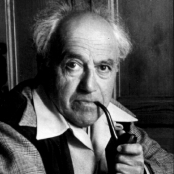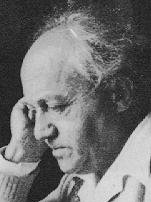Ernest Bloch (1880 - 1959)
 Ernest
Bloch was born in Switzerland and died at Agate Beach, Oregon. His work
divides into four main periods. In the earliest,
he falls under the influence of Richard Strauss
and Modest Mussorgsky, an odd combination,
to say the least. The works of this period--like the "Symphony in C#" and
the tone poem "Printemps-Hiver"
--impress you as trying to find their way. They have not absorbed their
influences; the joints show. Later, Bloch exchanges Strauss for Claude
Debussy and strengthens the Mussorgsky ties. This results in his opera
"Macbeth", considered by many as the finest operatic version of a Shakespearean
tragedy. The ties to Mussorgsky's "Boris Godunov" are apparent, but Bloch
has made Mussorgsky's devices (irregular metrical
shifts, odd chord progressions and cadences) his own.
Ernest
Bloch was born in Switzerland and died at Agate Beach, Oregon. His work
divides into four main periods. In the earliest,
he falls under the influence of Richard Strauss
and Modest Mussorgsky, an odd combination,
to say the least. The works of this period--like the "Symphony in C#" and
the tone poem "Printemps-Hiver"
--impress you as trying to find their way. They have not absorbed their
influences; the joints show. Later, Bloch exchanges Strauss for Claude
Debussy and strengthens the Mussorgsky ties. This results in his opera
"Macbeth", considered by many as the finest operatic version of a Shakespearean
tragedy. The ties to Mussorgsky's "Boris Godunov" are apparent, but Bloch
has made Mussorgsky's devices (irregular metrical
shifts, odd chord progressions and cadences) his own.
In the second, so-called "Jewish," period,
Bloch takes up specific Jewish subject matter (although not musical matter)
and writes the one work by which he is still remembered: "Schelomo", a
rhapsody for cello and orchestra based on the figure of Solomon and the
book of Ecclesiastes. During this time, he also produces psalm settings
for tenor and orchestra, the "Trois Poèmes juifs", and the suite
"Baal Shem" for violin and piano. Here, Bloch single-handedly creates a
manner all his own--epic, passionate, powerful--with obvious reminiscences
of cantorial melos. Once he finds this, for the most part, the specific
Jewish references become objectified, submerged, or turned to other expressive
uses. He will return to Jewish material for inspiration, but he no longer
writes specifically "Jewish" music. Indeed, many of his works seen as Jewish
actually have their origins in his imaginative vision of Asian and Pacific
jungles.
 About
this time, in the mid-1920s, with several significant works behind him,
Bloch decided to re-learn counterpoint. J. S. Bach
and Palestrina become profound new influences.
Yet, Bloch's neo-classicism
(in works like the "Concerto Grosso No. 1", "Piano Quintet No. 1", and
the "Sacred Service") sounds like nobody else's. The strong, epic quality
is still there, but construction just got tighter. It really impresses
a listener as a desire to get the most expressive
punch out of every musical line.
About
this time, in the mid-1920s, with several significant works behind him,
Bloch decided to re-learn counterpoint. J. S. Bach
and Palestrina become profound new influences.
Yet, Bloch's neo-classicism
(in works like the "Concerto Grosso No. 1", "Piano Quintet No. 1", and
the "Sacred Service") sounds like nobody else's. The strong, epic quality
is still there, but construction just got tighter. It really impresses
a listener as a desire to get the most expressive
punch out of every musical line.
During World War II, Bloch became too depressed to compose, but
the end of the war released a flood of new work, tending to the abstract,
and emphasizing chamber music
and chamber combinations. Bach continues as an influence, but so does late
Beethoven, particularly in Bloch's string
quartets 2-5. He began to experiment with serialism,
although again his musical soul remained his own.
Bloch is out of critical favor right now, along with an entire
generation of twentieth-century composers like Artur
Honegger, Darius Milhaud, and Ralph
Vaughan Williams. He takes big breaths, like Whitman, in a time which
prefers the ironic, the distant, and the understated, but he has both intellect
and passion.
Major works include "Schelomo" and "Voice in the Wilderness" for
cello and orchestra, the opera "Macbeth", five magnificent string
quartets (Roger Sessions regarded them
as among the best ever written), concertos
for violin and piano, two violin sonatas,
two concerti grossi, three suites for solo cello, the "Sacred Service"
("Avodath Hakodesh"), "Suite symphonique", "Sinfonia Breve", "Proclamation"
for trumpet and orchestra, "Suite hébraïque" for violin and
orchestra, two piano quintets, and two suites for solo violin (his last
works).
 About
this time, in the mid-1920s, with several significant works behind him,
Bloch decided to re-learn counterpoint. J. S. Bach
and Palestrina become profound new influences.
Yet, Bloch's neo-classicism
(in works like the "Concerto Grosso No. 1", "Piano Quintet No. 1", and
the "Sacred Service") sounds like nobody else's. The strong, epic quality
is still there, but construction just got tighter. It really impresses
a listener as a desire to get the most expressive
punch out of every musical line.
About
this time, in the mid-1920s, with several significant works behind him,
Bloch decided to re-learn counterpoint. J. S. Bach
and Palestrina become profound new influences.
Yet, Bloch's neo-classicism
(in works like the "Concerto Grosso No. 1", "Piano Quintet No. 1", and
the "Sacred Service") sounds like nobody else's. The strong, epic quality
is still there, but construction just got tighter. It really impresses
a listener as a desire to get the most expressive
punch out of every musical line.
 Ernest
Bloch was born in Switzerland and died at Agate Beach, Oregon. His work
divides into four main periods. In the earliest,
he falls under the influence of Richard Strauss
and Modest Mussorgsky, an odd combination,
to say the least. The works of this period--like the "Symphony in C#" and
the tone poem "Printemps-Hiver"
--impress you as trying to find their way. They have not absorbed their
influences; the joints show. Later, Bloch exchanges Strauss for Claude
Debussy and strengthens the Mussorgsky ties. This results in his opera
"Macbeth", considered by many as the finest operatic version of a Shakespearean
tragedy. The ties to Mussorgsky's "Boris Godunov" are apparent, but Bloch
has made Mussorgsky's devices (irregular metrical
shifts, odd chord progressions and cadences) his own.
Ernest
Bloch was born in Switzerland and died at Agate Beach, Oregon. His work
divides into four main periods. In the earliest,
he falls under the influence of Richard Strauss
and Modest Mussorgsky, an odd combination,
to say the least. The works of this period--like the "Symphony in C#" and
the tone poem "Printemps-Hiver"
--impress you as trying to find their way. They have not absorbed their
influences; the joints show. Later, Bloch exchanges Strauss for Claude
Debussy and strengthens the Mussorgsky ties. This results in his opera
"Macbeth", considered by many as the finest operatic version of a Shakespearean
tragedy. The ties to Mussorgsky's "Boris Godunov" are apparent, but Bloch
has made Mussorgsky's devices (irregular metrical
shifts, odd chord progressions and cadences) his own.